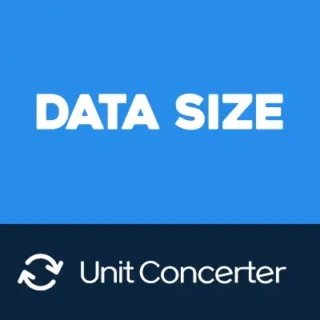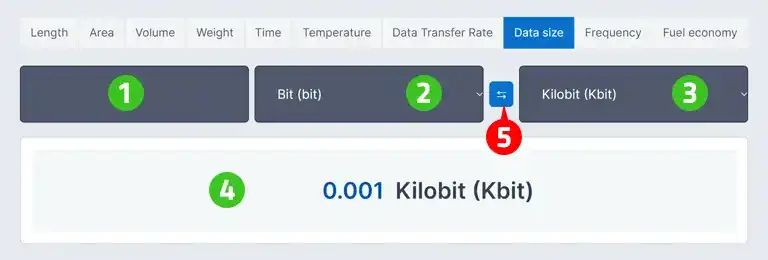Table Of Contents
Data Size Unit Converter?
A data size unit converter is a tool that can accurately convert various data transfer speed units such as “bits per second (bps), kilobits per second (Kbps), kibibits per second (Kibps), megabits per second (Mbps), mebibits per second (Mibps), gigabits per second (Gbps), gibibits per second (Gibps), terabits per second (Tbps), tebibits per second (Tibps), bytes per second (Bps), kilobytes per second (KBps), kibibytes per second (KiBps), megabytes per second (MBps), mebibytes per second (MiBps), gigabytes per second (GBps), gibibytes per second (GiBps), terabytes per second (TBps), and tebibytes per second (TiBps).”
Explanation of Data Size Units
Fundamental Concepts of Bits and Bytes
- Bit (bit)
A bit is the smallest unit of data. It is represented as 0 or 1 and is the basic way computers process and store information. - Byte (B)
A byte consists of 8 bits. It is commonly used to store one character. For example, the letter ‘A’ occupies 1 byte.
Kilo, Mega, Giga Units
- Kilo Unit (10^3 or 2^10)
Kilobit (Kbit): 1,000 bits (10^3 bits).
Kibibit (Kibit): 1,024 bits (2^10 bits).
Kilobyte (KB): 1,000 bytes (10^3 bytes).
Kibibyte (KiB): 1,024 bytes (2^10 bytes). - Mega Unit (10^6 or 2^20)
Megabit (Mbit): 1,000,000 bits (10^6 bits).
Mebibit (Mibit): 1,048,576 bits (2^20 bits).
Megabyte (MB): 1,000,000 bytes (10^6 bytes).
Mebibyte (MiB): 1,048,576 bytes (2^20 bytes). - Giga Unit (10^9 or 2^30)
Gigabit (Gbit): 1,000,000,000 bits (10^9 bits).
Gibibit (Gibit): 1,073,741,824 bits (2^30 bits).
Gigabyte (GB): 1,000,000,000 bytes (10^9 bytes).
Gibibyte (GiB): 1,073,741,824 bytes (2^30 bytes). - Tera Unit (10^12 or 2^40)
Terabit (Tbit): 1,000,000,000,000 bits (10^12 bits).
Tebibit (Tibit): 1,099,511,627,776 bits (2^40 bits).
Terabyte (TB): 1,000,000,000,000 bytes (10^12 bytes).
Tebibyte (TiB): 1,099,511,627,776 bytes (2^40 bytes). - Peta and Exa Units
Peta Unit (10^15 or 2^50)
Petabyte (PB): 1,000,000,000,000,000 bytes (10^15 bytes).
Pebibyte (PiB): 1,125,899,906,842,624 bytes (2^50 bytes). - Exa Unit (10^18 or 2^60)
Exabyte (EB): 1,000,000,000,000,000,000 bytes (10^18 bytes).
Exbibyte (EiB): 1,152,921,504,606,846,976 bytes (2^60 bytes).
These units are used to express data storage capacity or transmission speed, but there is a difference between binary prefixes and decimal prefixes.
Difference Between Binary and Decimal Prefixes
The major difference between binary and decimal prefixes lies in the base value used. Binary prefixes use powers of 2, while decimal prefixes use powers of 10.
For example,
1 KiB = 1,024 bytes
1 KB = 1,000 bytes.
Data Size Conversion Formula
Using the Data Size Unit Converter
Steps to Convert Data Size Units
When you first open the page, the default unit will be set to one bit (bit), and the converted values of all data size units will be displayed. If you need values in other units, follow these steps:
- Enter the value of the data size you want to convert in the first blank space.
- Choose the data size unit in the selection tool number 2.
- Select the target unit for the converted data size in number 3.
- Check the result in number 4.
- Click button number 5 to switch the data size units and display the result.
FAQ
How to Use the Data Size Unit Converter?
To use the data size unit converter, simply input the data size value you want to convert. The conversion to the selected “target unit” will be automatically calculated without the need to click a separate button. The result will be displayed directly below.
Which Units are Supported?
Our site supports conversion for a wide range of data size units including: bit (bit), kilobit (Kbit), kibibit (Kibit), megabit (Mbit), mebibit (Mibit), gigabit (Gbit), gibibit (Gibit), terabit (Tbit), tebibit (Tibit), byte (B), kilobyte (KB), kibibyte (KiB), megabyte (MB), mebibyte (MiB), gigabyte (GB), gibibyte (GiB), terabyte (TB), tebibyte (TiB), petabyte (PB), pebibyte (PiB), exabyte (EB), and exbibyte (EB).
Are There Any Usage Restrictions?
Our data size unit converter is provided free of charge and can be used without any limitations.
Can I Use It on Mobile Devices?
Yes, it works very well on smartphones. You can perform data size unit conversions on your smartphone just like on a PC.
What is the Accuracy of the Converter?
The converter demonstrates a high level of accuracy. While there may be minor discrepancies due to the significant differences in data size units and very small decimal places, it reliably utilizes international standard units and conversion formulas.
How Fast is the Unit Conversion?
Upon entering a number into the blank space, the converter calculates results almost instantly, providing fast and accurate conversion values.
Can I Use It Offline?
No, the data size unit converter provided on this page requires an internet connection. If you need to use it offline, you can manually calculate using the formulas provided in the text or save the page by right-clicking and selecting “Save As.”




I don’t even know how I ended up here, but I thought this post was good. I do not know who you are but certainly you’re going to a famous blogger if you are not already 😉 Cheers!
Thank you so much for leaving such a kind comment! I’m not a famous blogger yet, but reading messages like yours makes me feel proud of what I’m doing. I’d love for you to stop by again in the future! Wishing you all the best!